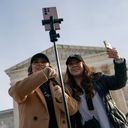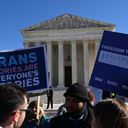Tests of Trump's power on fast tracks to the Supreme Court
Every one of President Trump's most sweeping executive orders is now being challenged in court by multiple lawsuits.
Why it matters: They're setting the stage for historic Supreme Court showdowns that could test Trump's push to remake the federal government — and increase his power.
- They also could provide roadmaps for how to stop him.
The big picture: Less than four weeks into Trump's term, the Justice Department is already defending signature parts of his agenda in more than 50 lawsuits.
- Judges have temporarily stopped several of his top priorities from taking effect — at least for now.
- But in many cases the White House is purposely pushing its legal limits, inviting this tsunami of legal challenges — signaling the administration's confidence that the conservative-led Supreme Court will back Trump when the time comes.
State of play: Three big pieces of Trump's agenda — immigration, trans rights and slashing the federal bureaucracy — seem particularly likely to make it to the high court, which last summer granted presidents broad immunity for "official acts" they carry out.
Immigration
Three federal judges — in New Hampshire, Maryland and Washington state — have ordered a freeze on Trump's Day 1 executive order to end birthright citizenship, including one who called it "blatantly unconstitutional."
- At least 22 states and other organizations have sued over Trump's order.
- Legal analysts mostly agree that Trump is likely to lose this one in the end.
With so many active cases on the matter, it's too soon to say which lawsuit is most likely to land on the Supreme Court's docket. But because it's such a sweeping policy — and because birthright citizenship is a constitutional question — the issue will be ripe for the court's review.
The federal workforce
Trump's effort to slash federal programs and the federal workforce has run into some snags in court, but it's an area on which legal experts believe he's likely to have the Supreme Court on his side.
- Some of the myriad challenges to Trump's various cuts are very specific, and will only pertain to certain employees or programs.
- But others raise bigger questions about the president's authority to fire federal workers. The Supreme Court already has taken an expansive view of that power.
Where it stands: Judges have temporarily blocked Trump's "buyout" deadline for federal workers and his decision to put thousands of employees at the U.S. Agency for International Development (USAID) on leave.
- As long as the administration keeps cutting workers one tranche at a time, there will be virtually no end to lawsuits challenging the moves.
What we're watching: When a case focuses on the details of how the White House carried out a spending cut, Trump could take some losses — at least temporary ones, analysts said.
- But the more the Justice Department can turn this universe of litigation into a big-picture referendum on the president's power over the federal workforce, the more likely it is to win — and win big.
Transgender rights
The Supreme Court seems likely to rule later this year that states can ban gender-affirming care for minors — a potential signal that Trump's moves to roll back federal protections for trans people probably will fare well.
- But they'll be some of the highest-profile suits the Justice Department will have to defend.
Where it stands: A federal judge temporarily blocked Trump's order that would transfer incarcerated transgender women to men's prison facilities, and would block them from receiving medical treatments for gender transitions.
- Trump also signed executive orders saying the U.S. government would recognize only two sexes, male and female, and ban transgender people from serving in the military.
- Lawsuits have been filed against both orders, but no judge has issued a ruling.
Between the lines: As congressional Democrats try to mount their resistance against Trump administration actions, they're likely to begin filing amicus briefs to support challenges.
- "We will be involved in all of them, and we're of course doing everything we can to speak up and to give heart and courage to the judges who are doing it," Rep. Jamie Raskin (D-Md.) the ranking member on the House Judiciary Committee, told reporters last week.
What to watch: As the courts become a battlefield for challenges to many of Trump's orders, some of the president's most vocal allies are questioning whether judges have authority of judges over many of the president's actions.
- Vice President Vance said Sunday that "judges aren't allowed to control the executive's legitimate power."
- Vance's comment, which has been echoed by Elon Musk and other Republicans, foreshadow what's likely to be a tense battle in courtrooms nationwide over Trump's norm-breaking changes to government.
Go deeper: Court rulings test limits of Trump's power


















